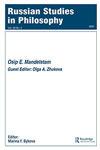回到悖论逻辑
IF 0.1
4区 哲学
Q4 Arts and Humanities
引用次数: 0
摘要
摘要:作者再次提出了悖论的定义,这个定义与黑格尔的矛盾概念有着根本的不同。在悖论中,思维应该从逻辑上识别和理解思维主体和思维对象的心理再现,将其视为不可想象的存在的非同一思维。这就是为什么Bibler主张出现一种新的逻辑,作为逻辑开端的逻辑,一种逻辑对话的出现是由于社会条件的变化和人类活动本身的转变。从共同劳动,活动变成了针对主体的普遍劳动,在这一点上,思维转向自身,悖论出现。本文章由计算机程序翻译,如有差异,请以英文原文为准。
Back to the Logic of Paradox
ABSTRACT The author once again offers a definition of paradox that fundamentally differs from a Hegelian notion of contradiction. In a paradox, thought should logically identify and comprehend the mental reproduction of the subject of thought and the object of thought as the nonidentical thought of an unthinkable being. This is why Bibler argues for the emergence of a new logic as the logic of the beginnings of logic, a dialogue of logics whose appearance is due to changing social conditions and a transformation happened in human activity itself. From joint labor, activity becomes universal labor directed at the subject, at which point thinking turns on itself and paradoxes emerge.
求助全文
通过发布文献求助,成功后即可免费获取论文全文。
去求助
来源期刊

RUSSIAN STUDIES IN PHILOSOPHY
PHILOSOPHY-
CiteScore
0.10
自引率
0.00%
发文量
14
期刊介绍:
Russian Studies in Philosophy publishes thematic issues featuring selected scholarly papers from conferences and joint research projects as well as from the leading Russian-language journals in philosophy. Thematic coverage ranges over significant theoretical topics as well as topics in the history of philosophy, both European and Russian, including issues focused on institutions, schools, and figures such as Bakhtin, Fedorov, Leontev, Losev, Rozanov, Solovev, and Zinovev.
 求助内容:
求助内容: 应助结果提醒方式:
应助结果提醒方式:


